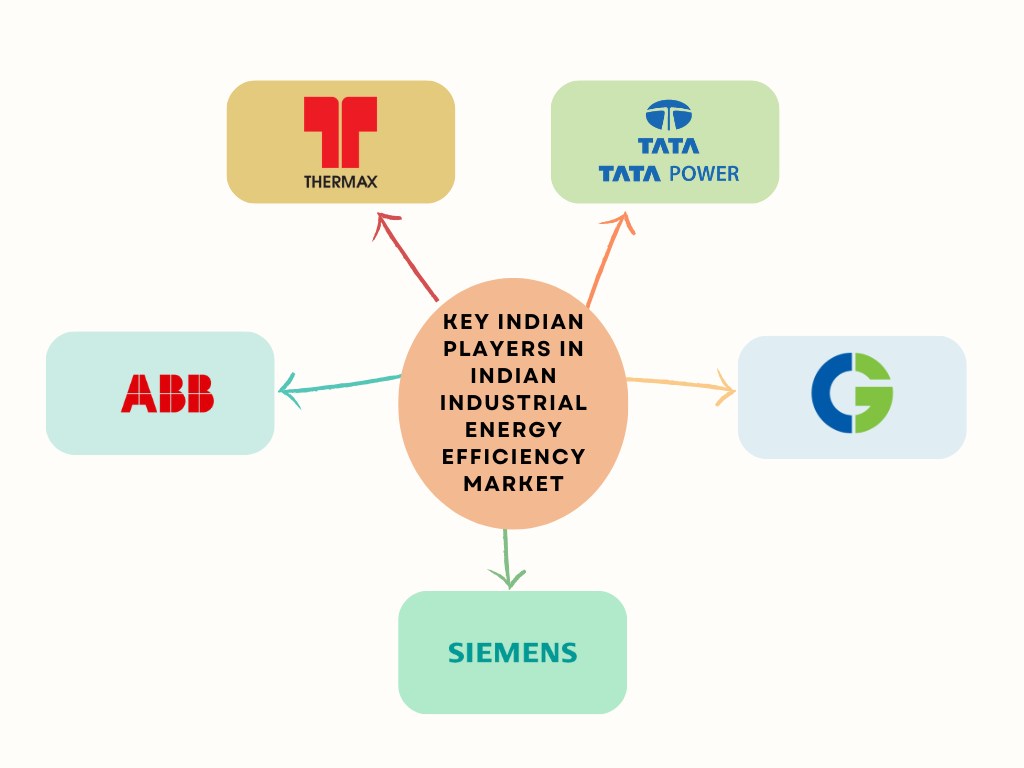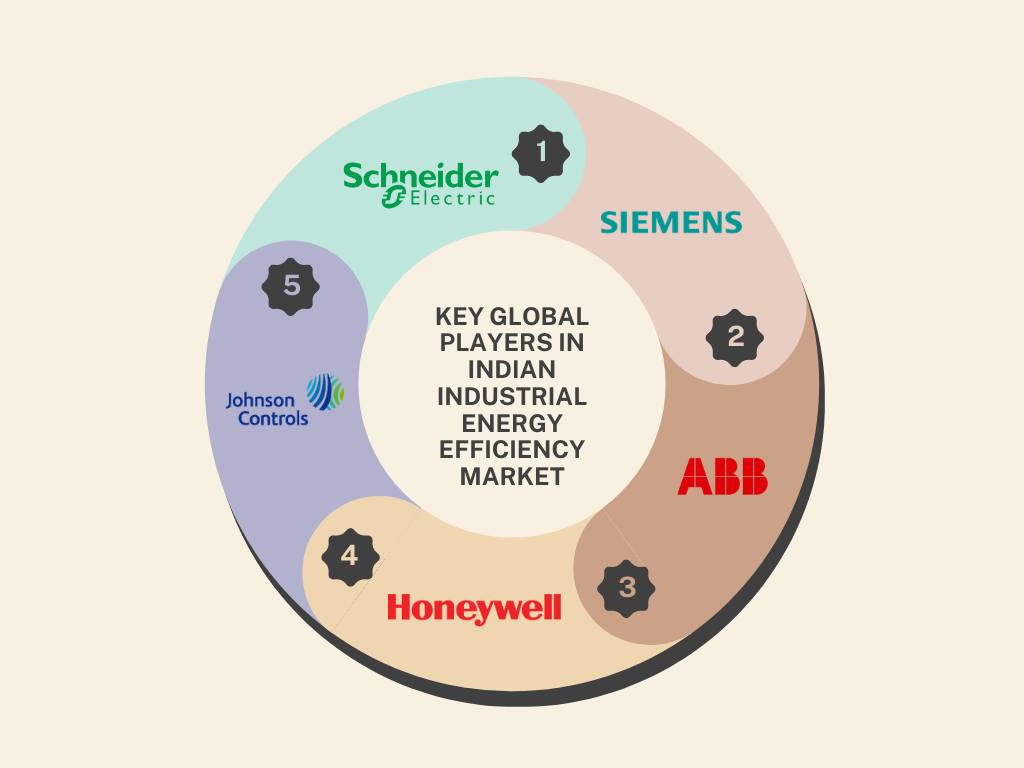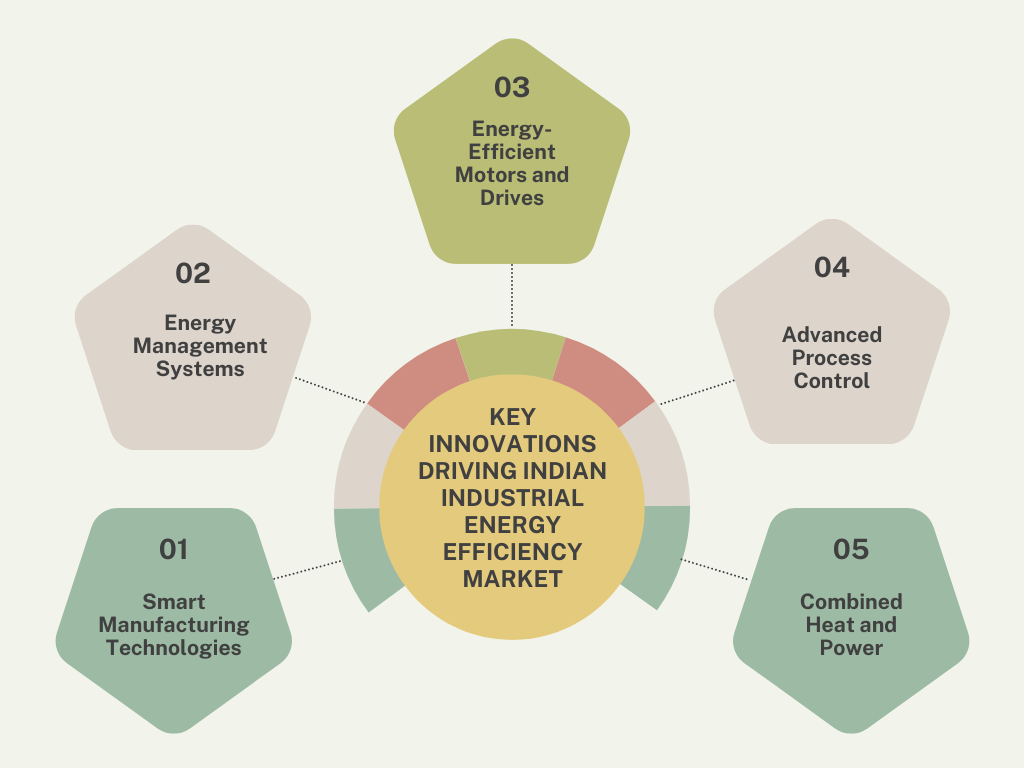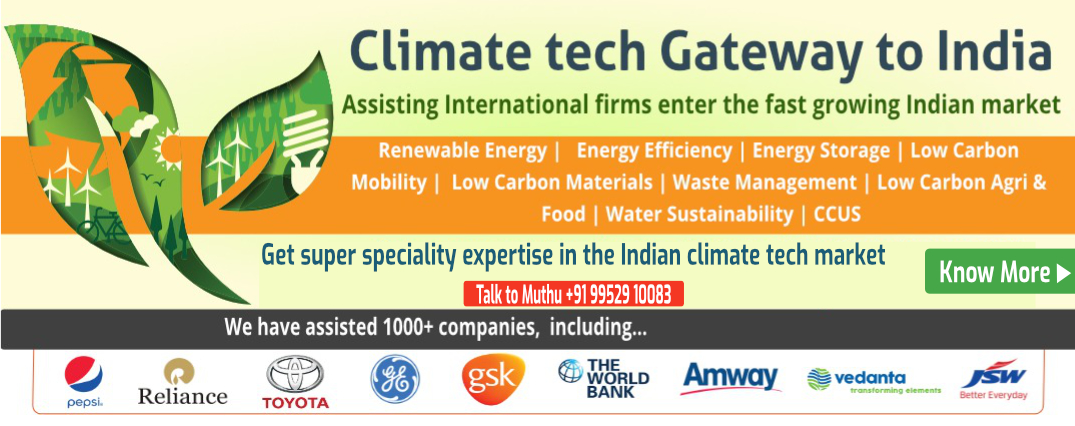Why is the Indian Industrial Energy Efficiency an Attractive Destination For International Investment?
- Growing Industrial Sector:
- India’s industrial sector is one of the largest in the world, contributing significantly to the country’s GDP and employment.
- According to the World Bank, India’s industrial sector accounted for about 30% of GDP in 2020.
- Rising Energy Demand:
- With rapid industrialization and urbanization, India’s energy demand continues to increase.
- The International Energy Agency (IEA) forecasts India’s energy demand to grow by more than 3% annually through 2040.
- Government Initiatives:
- The Indian government has launched various initiatives and policies to promote energy efficiency and sustainability in the industrial sector.
- The Perform, Achieve, and Trade (PAT) scheme under the Bureau of Energy Efficiency (BEE) mandates energy efficiency improvements in designated industries, creating opportunities for investment in energy-saving technologies.
- Incentives and Subsidies:
- The Indian government offers incentives, subsidies, and tax benefits to industries implementing energy efficiency measures.
- For example, the Ministry of New and Renewable Energy (MNRE) provides financial support for energy efficiency projects through schemes like the Energy Conservation Building Code (ECBC) and the Energy Efficiency Financing Platform (EEFP).
- Technological Advancements:
- International investors can leverage their expertise and technological advancements in energy-efficient solutions to address India’s growing energy demand.
- Advanced technologies such as energy-efficient motors, LED lighting, and process optimization systems offer significant energy savings potential for industries.
- Market Potential:
- India’s large industrial base presents a substantial market opportunity for energy efficiency products and services.
- The Indian industrial energy efficiency market is projected to grow significantly, driven by increasing awareness, regulatory requirements, and the need to reduce operating costs.
- Environmental Benefits:
- Investing in industrial energy efficiency not only helps reduce energy consumption and operating costs but also contributes to environmental sustainability by lowering greenhouse gas emissions and mitigating climate change impacts.
KEY INDIAN PLAYERS IN INDIAN INDUSTRIAL ENERGY EFFICIENCY MARKET

- Thermax Limited:
- Thermax Limited is a leading Indian engineering company specializing in energy and environment solutions.
- The company offers a range of energy-efficient products and solutions for industries, including boilers, heaters, heat recovery systems, and waste heat recovery systems.
- In 2020-21, Thermax reported a consolidated revenue of approximately INR 5,497 crore (around USD 735 million).
- Tata Power Energy Services (TPES):
- Tata Power Energy Services (TPES) is a subsidiary of Tata Power Company Limited, one of India’s largest integrated power companies.
- TPES offers energy efficiency services to industries, including energy audits, retro-commissioning, energy management services, and implementation of energy-efficient technologies.
- The company has implemented several energy efficiency projects across various industries, contributing to energy savings and sustainability.
- Crompton Greaves Consumer Electricals Limited:
- Crompton Greaves Consumer Electricals Limited (CGCEL) is a leading manufacturer of consumer electrical products in India, part of the CG Power and Industrial Solutions Limited group.
- CGCEL offers energy-efficient electrical solutions for industries, including motors, drives, and energy management systems.
- The company focuses on providing energy-efficient products and solutions to help industries reduce energy consumption and improve operational efficiency.
- ABB India Limited:
- ABB India Limited is a subsidiary of ABB Group, a global technology leader in electrification, robotics, automation, and motion.
- ABB India offers a wide range of energy-efficient solutions for industries, including drives, motors, power quality solutions, and automation systems.
- The company’s energy-efficient technologies help industries optimize energy consumption and improve productivity.
- Siemens Limited:
- Siemens Limited is a subsidiary of Siemens AG, a global technology powerhouse focusing on electrification, automation, and digitalization.
- Siemens India offers energy-efficient solutions for industries, including motors, drives, automation systems, and energy management systems.
- The company’s energy-efficient technologies enable industries to enhance energy efficiency, reduce operating costs, and achieve sustainability goals.
KEY INTERNATIONAL AND GLOBAL PLAYERS IN INDIAN INDUSTRIAL ENERGY EFFICIENCY

- Schneider Electric:
- Schneider Electric is a global leader in energy management and automation solutions.
- The company offers a wide range of energy-efficient products and solutions for industries, including power distribution, automation systems, energy management software, and building management systems.
- Schneider Electric has a significant presence in India and has implemented various energy efficiency projects across industries.
- In 2020, Schneider Electric reported global revenue of approximately €27.2 billion (around USD 30.8 billion).
- Siemens AG:
- Siemens AG is a global technology powerhouse focusing on electrification, automation, and digitalization.
- Siemens offers advanced energy-efficient technologies and solutions for industries, including drives, motors, automation systems, and energy management systems.
- Siemens has a strong presence in India and has implemented numerous energy efficiency projects across various industrial sectors.
- In fiscal year 2021, Siemens AG reported revenue of approximately €57.1 billion (around USD 64.6 billion).
- ABB Group:
- ABB Group is a global technology leader in electrification, robotics, automation, and motion.
- ABB offers a comprehensive portfolio of energy-efficient solutions for industries, including drives, motors, power quality solutions, and automation systems.
- ABB has a significant presence in India and has executed several energy efficiency projects across diverse industrial sectors.
- In 2020, ABB reported global revenue of approximately $26.8 billion.
- Honeywell International Inc.:
- Honeywell is a multinational conglomerate offering a range of technology solutions across various industries, including energy efficiency and sustainability solutions.
- The company provides energy-efficient products and solutions for industrial automation, control systems, building management, and HVAC systems.
- Honeywell has a presence in India and has implemented energy efficiency projects in collaboration with Indian industries.
- In 2020, Honeywell reported global revenue of approximately $32.6 billion.
- Johnson Controls International plc:
- Johnson Controls is a global leader in building technologies, including energy efficiency and sustainability solutions.
- The company offers a range of energy-efficient products and services for industrial automation, HVAC systems, building management, and energy management.
- Johnson Controls has a presence in India and has implemented energy efficiency projects in collaboration with Indian industries.
- In fiscal year 2020, Johnson Controls reported global revenue of approximately $22.8 billion.
GOVERNMENT POLICIES FOR INDUSTRIAL ENERGY EFFICIENCY
| Scheme / Initiative | Description | Key Features | Impact / Achievements |
|---|---|---|---|
| PAT Scheme | Flagship program by the Bureau of Energy Efficiency (BEE) under the Ministry of Power. | – Assigns energy consumption targets to energy-intensive industries. – Allows trading of Energy Savings Certificates (ESCerts) on the market. | – Covered eight industrial sectors. – Cumulative energy savings of over 227 Mtoe. |
| ECBC | Introduced by the Ministry of Power to promote energy efficiency in commercial buildings and industrial facilities. | – Sets minimum energy performance standards for new constructions and renovations. – Focuses on building envelope, lighting, HVAC, and electrical systems. | – Adoption by several states and union territories. |
| NMEEE | Part of the National Action Plan on Climate Change (NAPCC), aiming to promote energy efficiency measures in industries. | – Includes sub-programs like Market Transformation for Energy Efficiency (MTEE) and Energy Efficiency Financing Platform (EEFP). | – Facilitates investment in energy efficiency projects. |
| Energy Conservation Act, 2001 | Provides a legal framework for promoting energy conservation and efficiency measures. | – Mandates energy audits, building codes, labeling, and efficiency standards. – Empowers the BEE for energy efficiency initiatives. | – Facilitates regulatory measures and initiatives for energy conservation. |
KEY CHALLENGES FACED BY INDIAN INDUSTRIAL ENERGY EFFICIENCY MARKET
Net Zero by Narsi
Insights and interactions on climate action by Narasimhan Santhanam, Director - EAI
View full playlist- Initial Capital Investment:
- One of the primary challenges is the high initial capital investment required for implementing energy efficiency measures and technologies in industrial facilities.
- According to a study by the International Finance Corporation (IFC), the upfront cost of energy efficiency projects can be a barrier for industries, especially small and medium enterprises (SMEs).
- Awareness and Capacity Building:
- Lack of awareness and understanding of energy efficiency benefits and technologies among industrial stakeholders is a significant challenge.
- According to a survey conducted by the Confederation of Indian Industry (CII), a significant portion of industrial units in India lack awareness about energy management practices and technologies.
- Access to Financing:
- Limited access to financing and lack of suitable financial instruments for energy efficiency projects pose challenges for industrial enterprises.
- According to a report by the World Bank, access to financing is a major barrier for energy efficiency investments in India, particularly for SMEs.
- Technical Expertise:
- Shortage of technical expertise and skilled professionals in energy management and energy efficiency technologies is a challenge for implementing energy efficiency measures.
- According to a survey by the Bureau of Energy Efficiency (BEE), the availability of qualified energy auditors and energy managers is limited in India.
- Complexity of Industrial Processes:
- Industrial processes in sectors such as manufacturing, chemicals, and steel are often complex, making it challenging to identify and implement energy efficiency measures.
- Optimizing energy consumption in complex industrial processes requires specialized knowledge and customized solutions.
- Regulatory Compliance:
- Compliance with regulatory requirements and standards related to energy efficiency poses challenges for industrial enterprises.
- Adherence to standards such as the Perform, Achieve, and Trade (PAT) targets under the Bureau of Energy Efficiency (BEE) and the Energy Conservation Building Code (ECBC) can be demanding for industries.
KEY INNOVATIONS DRIVING THE INDIAN INDUSTRIAL ENERGY EFFICIENCY MARKET

- Smart Manufacturing Technologies:
- Innovations in smart manufacturing technologies, including Industrial Internet of Things (IIoT), artificial intelligence (AI), and advanced analytics, are transforming industrial operations.
- IIoT-enabled sensors and devices collect real-time data from equipment and processes, enabling predictive maintenance, process optimization, and energy efficiency improvements.
- According to a report by NASSCOM, the Indian IoT market is expected to reach USD 9 billion by 2020, with significant adoption across industries including manufacturing.
- Energy Management Systems (EMS):
- Energy management systems enable real-time monitoring, analysis, and control of energy consumption in industrial facilities.
- Advanced EMS platforms integrate with building automation systems, process control systems, and energy meters to optimize energy use and identify energy-saving opportunities.
- A study by MarketsandMarkets estimates the global energy management system market to grow from USD 10.55 billion in 2017 to USD 31.55 billion by 2023, with significant adoption in manufacturing industries.
- Energy-Efficient Motors and Drives:
- Energy-efficient motors and drives offer improved efficiency and performance compared to conventional technologies, reducing energy consumption in industrial applications.
- Innovations in motor design, variable frequency drives (VFDs), and permanent magnet motors contribute to energy savings and operational cost reductions.
- According to the Indian Bureau of Energy Efficiency (BEE), implementing energy-efficient motors and drives can result in energy savings of up to 30% in industrial applications.
- Advanced Process Control (APC):
- Advanced process control technologies optimize industrial processes to minimize energy consumption while maintaining product quality and throughput.
- APC systems use real-time data, predictive modeling, and optimization algorithms to adjust process parameters for maximum energy efficiency.
- A study by Transparency Market Research forecasts the global advanced process control market to reach USD 27.6 billion by 2026, driven by increasing adoption in industries such as oil and gas, chemicals, and manufacturing.
- Combined Heat and Power (CHP):
- Combined heat and power systems, also known as cogeneration, capture waste heat from industrial processes to generate electricity and thermal energy simultaneously.
- CHP systems improve overall energy efficiency by utilizing waste heat that would otherwise be wasted, reducing both energy costs and environmental impact.
- According to the Global Alliance for Clean Cookstoves, the Indian CHP market is expected to grow at a CAGR of over 7% from 2019 to 2025, driven by increasing industrialization and energy demand.





 Our specialty focus areas include
Our specialty focus areas include



